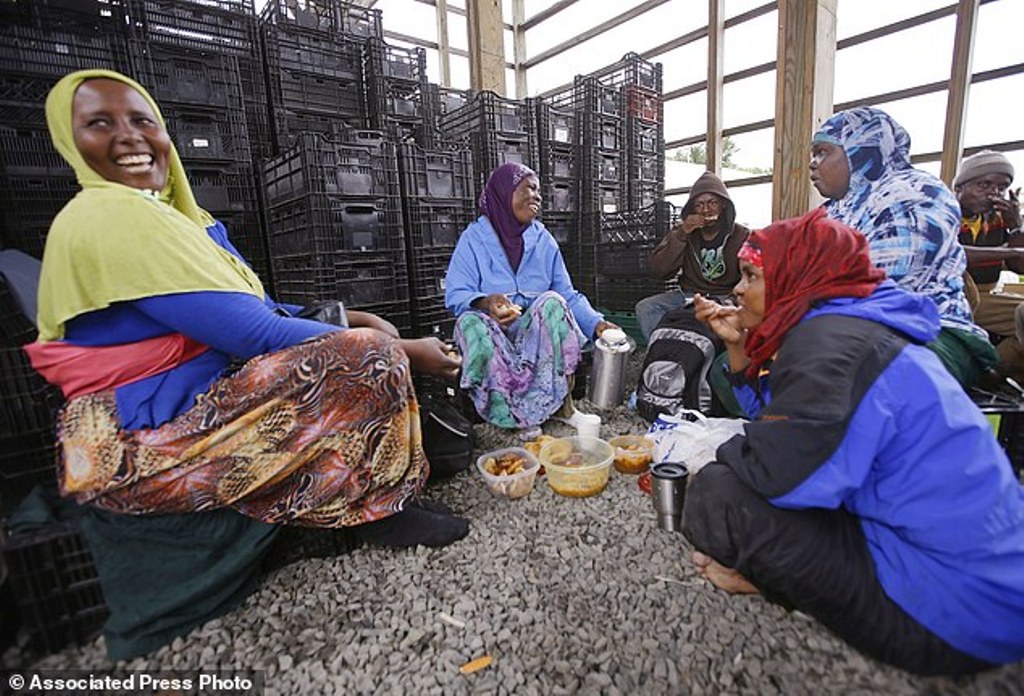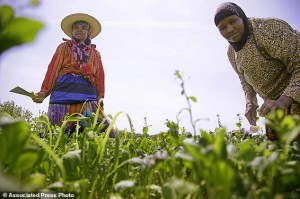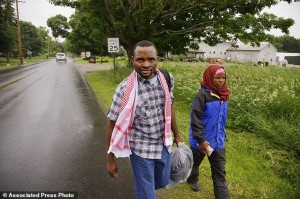Springfield (HAN) June 24, 2014 – Eritrea and Somali Refugee asylum seekers news update, by Paige Sutherland (AP). The American Mayor Domenic Sarno is the latest mayor to decry refugee resettlement, joining counterparts in New Hampshire and Maine in rare tensions with the State Department, which helps resettle refugees in communities across America. A United States of Massachusetts mayor is calling for an end to refugee resettlement in his city, saying Somali families are putting pressure on already strained services in Springfield, a onetime industrial center where nearly a third of the population lives below the poverty line.
Daniel Langenkamp, State department spokesman, “We make every effort to work with local State officials and other stakeholders to ensure the resettlement of Eritrea and Somali refugees are acceptable,” added his remarks.
Fatumo Mohamed, left, and Hamido Ali harvest Tat Soi, a leafy vegetable of the mustard green family, at Red Fire Farm. Production manager Fred Beddall when speaking about Somali refugee farm hands said, ‘They are indispensable to this farm, amazing workers’
The Massachusetts mayor is drawing criticism from those who say this country has a moral obligation to help the outcast and refugees who say they’re being scapegoated for problems the city faced long before their arrival.
“Why not talk about the problems in the city, why not talk about the houses that are unstable and in bad conditions, why only talk about the Somalis and Somali Bantus?” Mohammed Abdi, 72, said through an interpreter.
Somali Bantu refugee Adan Abdi walks with his wife Fatumo Mohamed back to her car after a rainy afternoon forced an early end to her work day as a farm hand
Sarno, leader of the state’s third-largest city, first demanded last summer that the U.S. government stop sending refugees. But after inspections found Somali families living in overcrowded, pest-infested apartments without electricity and sometimes heat, he stepped up complaints, saying agencies are bringing in “warm-weather” refugees and dumping them into cold climates only to leave them dependent on the city.
“I have enough urban issues to deal with. Enough is enough,” Sarno said in an interview. “You can’t keep concentrating poverty on top of poverty.”
Hard examples and evidence for the mayor’s stance are scant. The problems in the Somali housing have largely been attributed to neglectful landlords. The government does not track the number of refugees who rely on social services.
The refugee population in Springfield of about 1,500 — around 380 of them Somali and 312 Eritreans with 414 Ethiopians which represents about 3 percent of the city’s total of 153,000. And a 2014 report by the U.S. government found that Massachusetts ranked third in the nation for refugee employment, with 73 percent of refugees enrolled in state programs finding work.
Madino Idoor, a 35-year-old Somali with seven children, spent 12 years in a refugee camp before coming to the U.S. in 2004. She works two jobs — one at Goodwill and another as a dishwasher at the Barnes Air National Guard Base in nearby West field.
“I can work hard and provide for my family,” Idoor said. “I do not need for the mayor to worry about me.”
She and others wonder why the mayor is targeting an already vulnerable population, an idea reiterated Friday in a Boston Globe editorial.
“While Sarno raises valid points about needing adequate resources to accommodate newcomers, his stance is far too rigid and ignores both the moral imperative to help refugees and the benefits those refugees can bring,” the editorial read.
About 67,000 Somalis have come to the United States in the past decade, seeking refuge from civil war. Most have settled in Minnesota, California, Georgia and Washington, D.C.
In 2004, more than 100 Somalis came to Springfield, placed there because it met criteria including a public transit and other urban infrastructure. The community has grown as others reunite with family members.
Photo: Somali Bantu refugees, from left, Sahra Mahamud, Nateha Kabir, Abdi Kadir Hussein, Khadijo Monangrawa and Fatumo Mohamed take their lunch sharing traditional traditional Somalian food under a produce shelter as a steady rain falls at Red Fire Farm in Montague, near Springfield.
The latest updates Follow twitter.com/GeskaAfrika
Geeska Afrika Online (1985 -2014) – The International Gateway news and views about the Horn of Africa (Ethiopia, Eritrea, Somalia, Somaliland, Sudan, South Sudan, Djibouti, Kenya and Uganda), the best IGAD news and information Online Site for the last 20 Years.
–
HAN & Geeska Afrika Online (1985-2014), the oldest free independent Free Press in the region, brings together top journalists from across the Horn of Africa. Including Ethiopia, Somalia, Eritrea, Sudan, Djibouti, South Sudan, Uganda, Kenya, Oromo, Amhara, Somali, Afar and Harari. Plus, we have daily translations from 150 major news organizations in the Middle East and East African regions. Contact at news@geeskaafrika.com




Leave a Reply